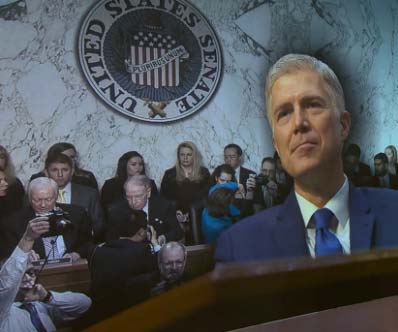
Hearings on Judge Neil Gorsuch's nomination to the Supreme Court begin on Monday. Just in case members of the Senate Judiciary Committee are having trouble coming up with questions, here are a few I would like to see asked.
1. The Supreme Court in its early decades rarely set aside federal laws. It first did so in 1803, and went another 54 years before doing it again. So at least one of the following three things would seem to be true. Either the federal government now enacts a lot more unconstitutional laws; or the justices gained a better understanding of their jobs as the Founding receded into history; or the Court has seized more and more power from the other branches. Which explanation makes the most sense?
2. The 1958 case Cooper v. Aaron marked the first time the Court claimed that its decisions on the meaning of the Constitution themselves count as the supreme law of the land. Was it right? Abraham Lincoln, on the other hand, rejected the idea that "the policy of the Government upon vital questions affecting the whole people is to be irrevocably fixed by decisions of the Supreme Court." Was he wrong?
3. Article III, Section 2, of the Constitution says that Congress may make "exceptions" and "regulations" to the Supreme Court's appellate jurisdiction. Some people argue that Congress may use that power, and a similar power over the lower federal courts, to shield particular federal laws from judicial review. Do you agree?
4. From the 1820s onward, the Supreme Court has taken the Constitution's grant of power to regulate interstate commerce to mean that the Court should block states when they try to regulate it. In recent years, conservative justices have argued that this "negative" or "dormant" commerce clause is an illegitimate judicial invention - and you went out of your way to mention their position in one of your own judicial opinions. Isn't the clause simply an inference from the constitutional text, like the power of judicial review itself?
5. The Court's annual docket has shrunk over time. Has that reduction been good for the rule of law, the separation of powers, federalism, and constitutional government in general?
6. Are there circumstances in which an otherwise constitutionally sound policy might be rendered unsound based on the intent of the officials who established it, as expressed in their public statements and those of their associates?
7. As has been widely reported, you studied at Oxford under John Finnis, author of Natural Law and Natural Rights. Our Declaration of Independence rests its claims of equality and unalienable rights on "the laws of Nature and of Nature's God." How should principles of natural law inform the work of a judge, particularly when considering a law that may seem to contradict those principles?
8. If a Supreme Court precedent interpreted the Constitution incorrectly, is that sufficient reason to overturn it? That seems to be the position of Justice Clarence Thomas. If he is wrong, what else is necessary to overturn a constitutional precedent?
9. Everyone agrees that it would be improper for a nominee to commit during his confirmation hearings to decide possible future cases in particular ways. Because of that concern, nominees usually get away with refusing to share their views about what the Constitution says about controversial topics. But the Court exercises vast power over American life. When it makes a mistake, what checks are there on it? The constitutional amendment process is difficult by design; we're not supposed to ask future judges if they will correct particular mistakes; and even our criticisms of the courts are taken to be threats to judicial independence. So what are we supposed to do?
Other, that is, than voting to confirm you.
Comment by clicking here.
Ramesh Ponnuru has covered national politics and public policy for 18 years. He is an author and Bloomberg View columnist.


 Contact The Editor
Contact The Editor
 Articles By This Author
Articles By This Author